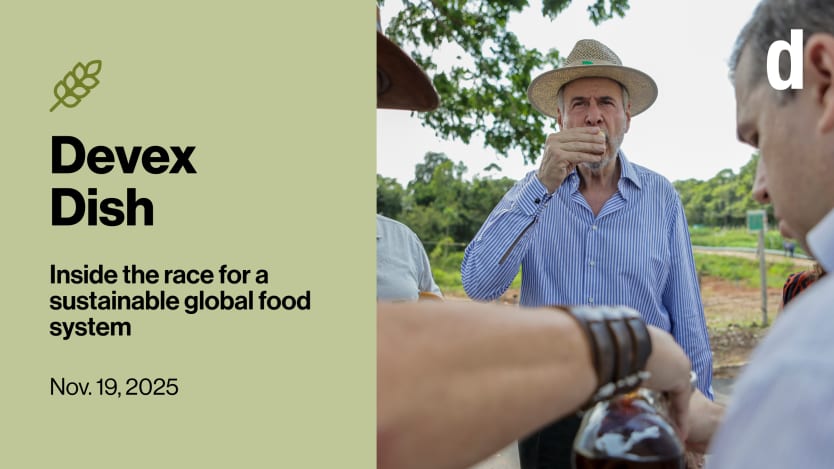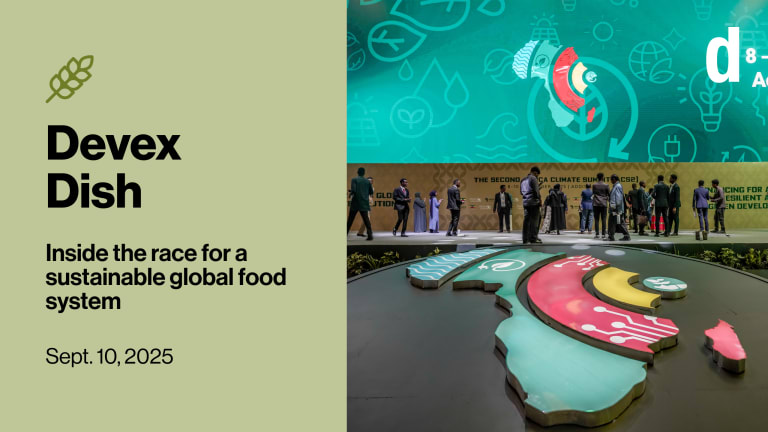Presented by Pivotal

Two kilometers south of the main COP30 Blue Zone in Belém lies the AgriZone — which, as the name suggests, is all about agriculture. Embrapa, the Brazilian state-backed agricultural research institute, is the official host, but the corporate imprint is unmistakable: Bayer and Nestlé are among the sponsors.
At one booth, a staffer walked me through Bayer’s soil regeneration efforts. At another, Nestlé — fresh off its exit from the Dairy Methane Action Alliance, which aims to reduce the impact of dairy farming on global warming — quizzes visitors on cattle health. A correct score earned a cheerful moo from the speakers and two mini chocolate bars.
A panel hosted by the Inter-American Institute for Cooperation on Agriculture offered a clearer look at how big firms say they want to scale regenerative agriculture. Reps from PepsiCo and fertilizer giant Yara highlighted their investments in Brazil, a farmer from Alabama stressed that incentives drive producer behavior, and an official from Mexico’s Chiapas state pointed to the earning potential of specialized crops such as boutique small lot coffees. Several speakers emphasized policy as the main accelerator, with PepsiCo Vice President Dan Christenson arguing that strong public signals — such as the U.S. climate-smart commodities program paying for climate-friendly practices — can help unlock private capital for regenerative agriculture.
Still, the AgriZone has faced criticism from civil society groups who say the space glosses over the contradictions inherent in a corporate-dominated agricultural system. Last week, climate activists protested outside the building. Brazil’s agricultural sector is a top cause of deforestation and biodiversity loss in the Amazon and Cerrado savanna, as well as a major source of greenhouse gas emissions.
“You enter the AgriZone and you have the screens around you and this really immersive experience showing degraded soils and forest fires, but there is nothing connecting it to how industrial agriculture is one of the reasons these things are happening,” Marie Cosquer, an advocacy analyst for food systems and climate at Action Against Hunger, told me.
More than 300 lobbyists for food and farming orgs are on the ground at COP30 — higher than last year’s COP in Baku but lower than Dubai in 2023, according to investigative news outlet Desmog. Among them are representatives from Brazilian meat giant JBS, the world’s largest beef producer, which is promoting what it calls sustainable, low-carbon beef and is leading efforts to bring a private-sector voice to COP30.
“Low-carbon beef is really a distraction tactic by the beef industry, like the oil and tobacco industry before them. It’s really a reflection that industry is feeling the pressure,” said Caitlin Smith, campaign manager at the Changing Markets Foundation, which is tracking how agribusinesses are influencing COP30 discussions. JBS’s global emissions are roughly equivalent to those of Spain.
On Monday, U.S.-based meat giant Tyson agreed to stop saying it was offering “climate-smart beef” following a lawsuit by an environmental group. JBS has also been accused of making false climate claims in a separate U.S. lawsuit filed last month. (JBS rejected the accusations.) The corporation spends a tiny share of its annual revenue on low-carbon solutions, Smith argues, and spotlighting those efforts can obscure the larger issue: the need to cut overall beef consumption to reduce deforestation and methane emissions from livestock.
Advocates stress that this isn’t about painting all agribusinesses with the same brush. Brands such as Danone and the Bel Group have reported laudable methane reductions ahead of COP30, and campaigners say more companies should be pressed to follow their lead. The stakes are rising as Brazilian firms expand abroad, including JBS’ new ventures into markets such as Nigeria.
That raises a broader question for lower-income countries: What kind of model for agricultural growth does Brazil represent? In less than three decades, the country went from net food importer to major exporter, powered by both land expansion and productivity gains. Export-oriented soybean farming has supported jobs and boosted GDP. But it also comes with high environmental costs, vulnerability to global price swings, and deepening inequality as agricultural expansion consolidates landholdings.
Read our preview of Week 2: Ministers arrive, money stalls, and minerals teeter at COP30
Keep up with COP: Reporters’ notebook — Day 9
ICYMI: Food and climate at COP30 — 5 things to watch in Belém
+ Happening today at 12 p.m. ET (6 p.m. CET): Devex Editor-in-Chief Raj Kumar sits down with World Resources Institute CEO Ani Dasgupta to look at what strategies work in the field of climate funding. There’s still time to save your spot. This event is exclusively for Devex Pro members. Not a Pro member yet? Start your 15-day free trial today.
Sharm el-Sheikh will have to Sharm el-Wait
COP30 negotiators finally wrapped up the Sharm el-Sheikh joint work on agriculture and food security on Friday, but they only reached procedural conclusions. Much of the text is still bracketed, meaning countries haven’t yet agreed on the language. The process, which is supposed to guide how agriculture fits into climate action, acknowledges that while farming sustains billions of livelihoods, it is deeply vulnerable to climate impacts and is also a major greenhouse gas emitter. CGIAR said the draft reflects years of advocacy to link food, climate adaptation, and climate mitigation, but the core sticking point is the same as ever: finance. Countries remain split on how much space carbon markets should have, what role technology should play, and how to structure support. The work is meant to conclude in 2026, so the clock is ticking.
A few things to keep an eye on next: whether the just transition work program keeps language on food, including the reference to smallholder farmers that appears in the draft.
Some other highlights from Belém:
• Modest wins on methane: Global methane emissions are falling, and existing nationally determined contributions and methane action plans could cut methane by 8% by 2030 compared with 2020 — the biggest, most consistent drop on record, according to a United Nations Environmental Programme report. But that is far short of the Global Methane Pledge’s 30% goal, and UNEP says only “full implementation of maximum technically feasible reductions” will close the gap. Recent progress comes largely from slower natural gas demand and stricter waste rules in Europe and North America, yet agriculture remains a major blind spot: Methane is projected to rise by about 8% by 2030 and 17% by 2050, driven by population growth and expanding livestock herds in Africa and Latin America. Even with full implementation of current plans, agricultural emissions would climb by up to 4% by 2030.
• Big money: CGIAR — the global research partnership focused on food security, climate resilience, and agricultural innovation — has secured more than $142 million in new funding commitments at COP30. The United Kingdom pledged £76 million; Denmark, $18.5 million; Belgium, €16 million; and Canada, CA$8 million, all in support of CGIAR’s research portfolio. Governments framed these commitments as part of their efforts to advance the newly adopted Belém Declaration on Hunger and Poverty.
• Land back: Eight countries are backing a new Brazil-led effort to channel serious money into restoring degraded farmland. The Resilient Agriculture Investment for net-Zero land degradation, or RAIZ, accelerator is designed to help governments unlock and direct public and private capital toward large-scale land restoration. It will provide technical assistance across four steps: mapping degraded landscapes to identify priority areas; pinpointing restoration solutions and assessing how to finance them; designing coinvestment mechanisms that can de-risk and crowd in private capital; and creating a space for countries, investors, and technical agencies to exchange lessons.
ICYMI: As COP30 begins, new funding targets methane from oil, rice and waste
Ultra-processed and ultra-problematic
In non-COP30 news, a much-anticipated Lancet series is sounding the alarm on the global rise of ultra-processed foods. Three papers led by 43 experts argue that UPFs are now deeply entrenched in global diets. Because of this, the authors state that UPFs pose an urgent public health risk that governments must address with the same policymaking vigor used to fight the tobacco industry. UPF consumption has tripled in countries such as Spain, China, and Argentina over the past three decades, and already comprises more than half of daily intake in the U.S. and U.K. The papers synthesize more than 100 long-term studies linking high UPF intake to increased risks of obesity, type 2 diabetes, cardiovascular disease, depression, and early mortality.
The authors also detail how a handful of global food and beverage companies — including Nestlé, PepsiCo, Unilever, and Coca-Cola — have reshaped food environments through marketing and political influence, often stalling regulation. As Dr. Neena Prasad of Bloomberg Philanthropies puts it, “We need to put public health ahead of the profits of a handful of industries, because there's overwhelming evidence for governments to act right now.”
The series highlights governments in Latin America and sub-Saharan Africa as policy leaders, with measures ranging from front-of-package warning labels and food taxes to school meal standards that curb UPF use.
Read: ‘Emergency’ — Lancet studies sound alarm on rise of ultra-processed foods
See also: Obesity is on the rise in Africa. Here’s what UNICEF is doing about it
And don’t miss: Can warning labels help to guide consumers and counter obesity?
A mouthful
“Debt has become a silent famine.”
— Former Ethiopian Prime Minister Hailemariam DessalegnAfrica could be a breadbasket for the world, but not if debt interest repayments keep taking up nearly one-fifth of African countries’ revenues, Dessalegn argues in an opinion piece for Devex. The continent is home to 60% of the world’s uncultivated arable land, yet it spends billions annually importing food. “For Africa, this burden has a specific consequence: It diverts resources away from the one sector that can transform lives, strengthen democracy, and stabilize the global food system: agriculture,” writes Dessalegn, who heads the Africa Food Systems Forum.
As the Group of 20 leading economies meets this week in Johannesburg, South Africa — the first G20 gathering on the African continent — it’s time for the group to rethink its approach to sovereign debt, he argues. And it’s not about canceling obligations, “but about creating a system that encourages investment and growth.” The G20 can start by proving its Common Framework for Debt Treatments actually works. In addition to debt relief, Africa needs smart financing solutions to channel capital to the continent’s fields and food systems.
Opinion: Africa can feed the world if the G20 frees it from debt
Related: 5 takeaways from the Africa Food Systems Forum
Chew on this
In its 2026 Global Outlook, the World Food Programme said 318 million people were expected to face crisis levels of hunger or worse next year, more than double the number in 2019. [Reuters]
Crop diversity is the future of food, but it’s eroding fast. Decisions made at a meeting next week in Lima, Peru, could save it. [Devex Opinion]
USAID veteran and agriculture advocate David Bathrick dies at 84. [Devex]
Update, Nov. 19, 2025: This story has been updated to clarify that Nestlé left the Dairy Methane Action Alliance.








